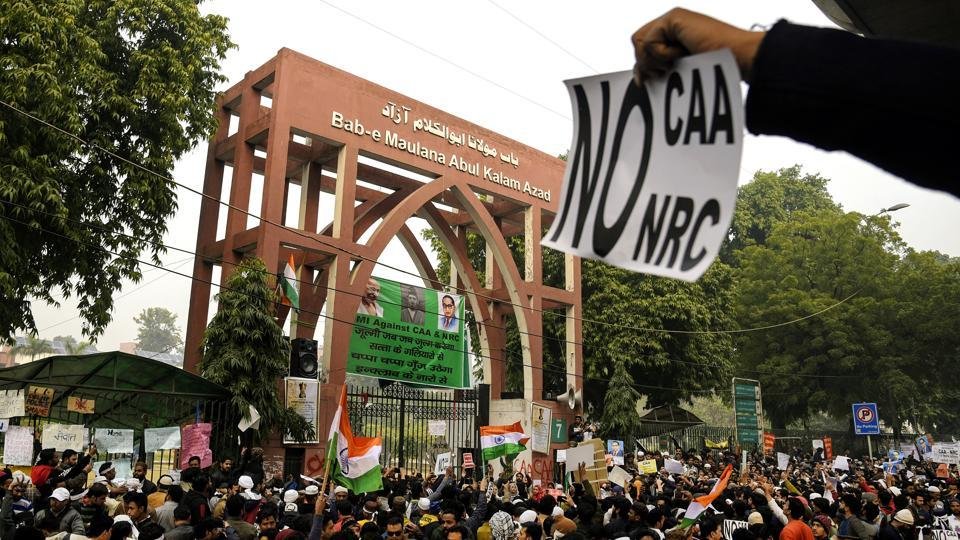
Protestors hold placards as they attend a protest against the Citizenship Amendment Act 2019 and NRC at Jamia Millia Islamia in New Delhi.
Proof of date, place, year of birth: Documents needed if nationwide NRC is implemented
The protests have intensified after CAA was enacted on December 12 and more than a dozen people have been killed during the agitations.

The NRC in Assam was mandated and monitored by the Supreme Court in 2014 and was based on the 1951 NRC done in Assam and voters’ lists of 1961, 1966 and 1971 — together bunched as legacy documents.
The claim of every Assam resident was verified with these legacy documents. The final list was published on August 31 and excluded 1.9 million people after close to 33 million applied for it.
The Centre will implement and monitor the nationwide NRC and documents required to prove one’s citizenship may not be similar to those accepted in Assam. The government is yet to specify the documents that would be needed.
Here is what the government document says about NRC:
Q 1 Is NRC a part of the CAA?
Ans. No. CAA is a separate law and NRC is a separate process. The CAA has come into force nationwide after its passage from Parliament, while the NRC rules and procedures for the country are yet to be decided. The NRC process that is going on in Assam has been implemented by the Honourable Supreme Court and mandated by the Assam Accord.
Q 2 By conducting NRC, will we be asked to present proofs of us being Indian?
Ans. First of all, it is important to know that at the national level, no announcement has been made to begin NRC process. If it is implemented, it does not mean that anyone will be asked for proof of being Indian. NRC is merely a normal process to register your name in the Citizens’ Register. Just like we present our identity cards or any other document for registering our names in the voter list or getting Aadhaar Card made, similar documents shall need to be provided for NRC, as and when it is carried out.
Q 3 How is citizenship decided? Will it be in the hands of the government?
Ans. Citizenship of any person is decided on the basis of The Citizenship Rules, 2009. These rules are based on the Citizenship Act, 1955. This rule is publicly in front of everyone. These are five ways for any person to become a citizen of India:
I. Citizenship by Birth,
II. Citizenship by descent,
III. Citizenship by registration,
IV. Citizenship by naturalization
V. Citizenship by incorporation
Q 4 Will I have to provide details of the birth of parents etc. to prove my Indian citizenship?
Ans. It would be sufficient for you to provide the details of your birth such as date of birth, month, year and place of birth. If you do not have the details of your birth, then you will have to provide the same details about your parents. But there is absolutely no compulsion to submit any document by/of the parents. Citizenship can be proved by submitting any documents related to date of birth and place of birth. However, a decision is yet to be taken on such acceptable documents. This is likely to include voter cards, passports, Aadhaar, licenses, insurance papers, birth certificates, school leaving certificates, documents relating to land or home or other similar documents issued by government officials. The list is likely to include more documents so that no Indian citizen has to suffer unnecessarily.
Q 5 Do I have to prove ancestry dating back before 1971?
Ans. No. for pre-1971 genealogy, you do not have to submit any type of identity card or any documents like the birth certificate of parents/ancestors. It was valid only for the Assam NRC, based on the ‘Assam Accord’ and the directive of the Honourable Supreme Court. For the rest of the country, the NRC process is completely different and under The Citizenship (Registration of Citizens and Issue of National Identity Cards) Rules, 2003.
Q 6 If it is so easy to prove identity, then how 19 lakh people in Assam were affected due to NRC?
Ans. Infiltration is an old problem in Assam. To curb it, there was a movement and in 1985, the then Rajiv Gandhi government, to identify the intruders, had to enter into an agreement to prepare NRC, assuming the cut-off date of 25 March 1971.
Q 7 During NRC, will we be asked to present old documents, which are difficult to collect?
Ans. There is nothing like that. Common documents will only be required to prove identity. When the NRC is announced at the national level, then rules and instructions will be made for it in such a way that no one will face any trouble. The government has no intention of harassing its citizens or putting them in trouble.
Q 8 What if a person is illiterate and does not have relevant documents?
Ans. In this case, the authorities will allow that person to bring a witness. Also, other evidence and community verification etc. will also be allowed. A proper procedure will be followed. No Indian Citizen will be put in undue trouble.
Q 9 There are a large number of people in India who do not have homes, are poor and are not educated and they do not even have any basis of identity. What will happen to such people?
Ans. This is not entirely correct. Such people were on some basis and they also go the benefit of the welfare schemes of the government. Their identity will be established on the basis of that.
Q 10 Does NRC exclude anyone for being transgender, atheist, Adivasis, Dalits, women and landless without/ without documents?
Ans. No NRC, as and when carried out does not affect any of the mentioned above.
